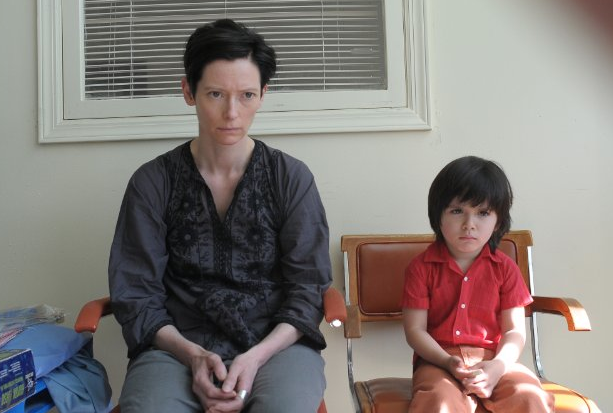We need to talk about Kevin
We Need to Talk About Kevin isn’t the first film this year to outlast its immediacy.
A novel written by Lionel Shriver in the wake of the Columbine school killings, director Lynne Ramsay has been trying to make the film since her last feature, Morvern Callar, in 2002. The unusually long gestation period has stripped the story of its ripped-from-the-headlines quality. It now plays like a quaint, violent memory. These are the under-parented demon children of not so long ago, not the ultra-wired sweethearts of today, the ones who are moving back into their parents’ homes at farm-like rates.
The distance has one benefit. It has given us the opportunity to re-assess cultural mythology surrounding violence. Compare the school shootings of Columbine to the attempted shooting of US Representative Gabrielle Giffords. During Columbine, the national media twisted the story to fit any number of evergreen social maladies: access to guns, under-parenting, schoolhouse jocks gone wild. In the Giffords shooting, similar spin largely failed. People accepted the shooter’s primary and overwhelming responsibility.
Tragedy never lacks for explanations. The power to assign a narrative is the power to assert control over the chaotic. In a sense, that is the mission of Tilda Swinton’s Eva Khatchourian, running through her memory, testing her feelings of collective guilt in order to take power over the crimes of her son.
The centerpiece of We Need to Talk About Kevin is the mother-son relationship and the ties between love and dependency. Her son understands these ties intuitively. He is a master manipulator of love. In fact he sees no other purpose for it, understanding from an early age how to use it to wound. A bizarre response–to our mind–are her long drives to visit her son in juvenile prison. Her final act of love clarifies it, seeming both reassuring and wicked. We can choose to live up to our obligations of decency, even to those who use it to push us away.
Kevin will leave Ramsay’s reputation as a talented visualist in good stead. Her use of red and yellow, bloody and attracting colors, is striking. As a storyteller Ramsay seems interested in twisted tales on the borderline of affection and manipulation. Her unconventional heroines are left by narcissistic men to navigate through acts of violence. She focuses on their quiet steel while also noticing their tough-to-like elements.
The running feeling of We Need to Talk about Kevin is circular. It bounces around the chronology. We bump into the same imagery in different places, such as the image of Kevin sucking on food, a tendency that appears to be stuck in the mother’s mind. The style eventually bogs down the film–movies can run in circles, but each circle needs to be further down the road than the last. However, Eva is bogged down, forever surrendered to this central event. Her whole life leads up to it, and leads away from it. We Need to Talk About Kevin is a movie about moving on without being able to move on.





